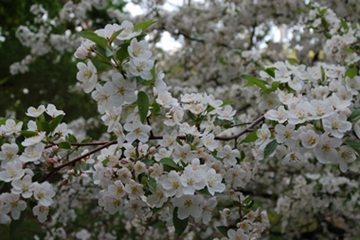Variety is the Spice of Life
Written by: Jake Kubisiak, Certified Arborist IL-1392A
Posted: 2018 | Disease Treatment | Winter
No individual species takes this saying to heart quite as literally as the Crabapple. Numerous cultivars are readily available and viable for our landscapes. A quick check of a local nursery inventory revealed 39 possible options. Canopy size and shape, flower color, fruit size and color, leaf coloration, and other more subtle differences are available to meet the desired wants and needs in the landscape. This diversity and a hardy reputation for establishment make this species a very common choice.
Crabapples are also typically susceptible to the common leaf disease Apple Scab. In recent years this disease seems to have become virulent and more difficult to control even with recommended treatment applications. Several factors play a part in this overall disease issue:
-Variance of cultivar disease resistance
-Canopy density and exposure to sunlight and airflow
-Moisture and temperature of spring season
-Possible resistance of Apple Scab fungus to chemical controls
Crabapples are rated based on the cultivar resistance to the leaf disease Apple Scab. Individual cultivars are rated Poor, Fair, Good or Excellent. Being resistant does not mean immune. A somewhat common occurrence is finding previously highly disease resistant trees developing symptoms as the tree ages. This could partially be due to density of the tree canopy creating a more ideal environment for the initial infections to occur. However, it is also linked to changes in the disease pathogen or changes in the level of resistance of the individual tree over time. Either way previously untreated trees may benefit from regular treatment.

The overall density of the canopy should be reviewed to ensure enough sunlight is penetrating the interior. Pruning to thin the tree canopy, improves sunlight and airflow to the leaf surface. This is beneficial not only for balanced growth, but also to reduce disease occurrence. Removing over crowded growth allows the increased sun and air flow to dry out the interior canopy reducing disease occurrence.
Reducing surrounding tree growth for less shade around the canopy can also benefit this disease control.

The Apple Scab infection cycle begins in the spring season. At this time young leaves are thin and easily infected, precipitation often wets the leaf surface and temperatures are ideal for growth of the disease pathogen. The previous 3-4 spring seasons were nearly perfect weather for disease development. Moisture and temperature are key factors in determining severity and occurrence of infections. Rain and wind also play a part in affecting our ability to make treatment applications.
A more recent development is possible resistance of the disease to certain treatment materials. It is our goal to always use the most up to date information available when making choices of product usage. For 2018 based on discussion with UW Extension disease experts we will be moving to a different product than has been utilized in past seasons. We also rotate products during the season to obtain optimal results and reduce the development of resistance.
Working with nature and weather is a challenge. At Wachtel Tree Science our team of professionals is always looking to meet these challenges head on to provide great quality service for your trees and great experiences for you, our clients.





